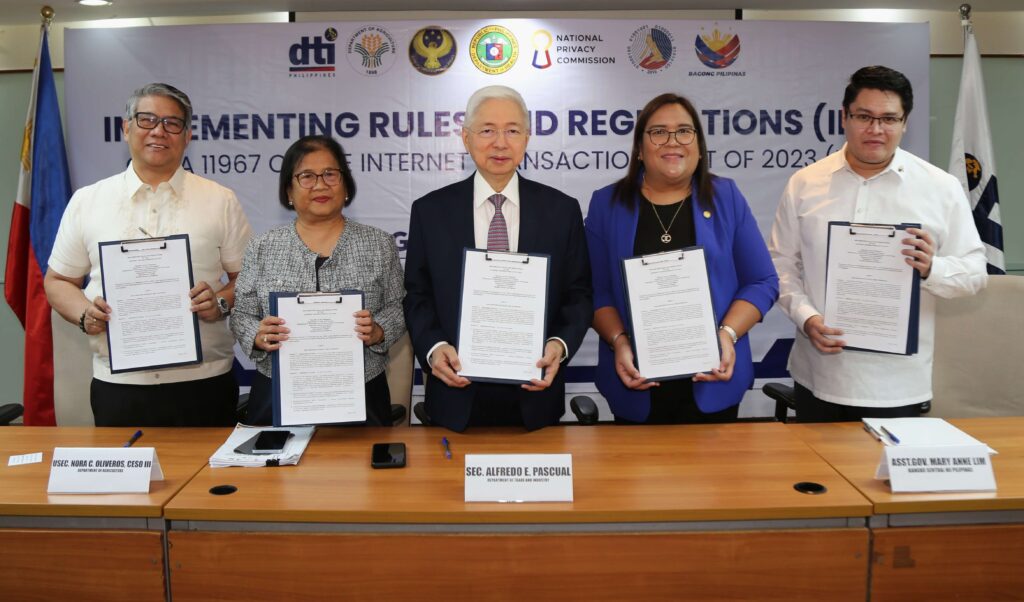Online shopping has brought a lot of convenience into consumers’ lives. It has also created a more competitive business landscape, especially for micro, small, and medium enterprises (MSMEs) in the country. In 2023, the Department of Trade and Industry (DTI) registered an unprecedented 984,330 business names, marking a 5-percent increase compared to the previous year. Notably, 18,153 of these registrations were categorized under the “Retail Sale via Internet” business activity.
However, in typical fashion surrounding financial transactions, scammers have found new ways to also take advantage of online transactions–and such fraudulent activities affect Filipinos’ trust in electronic commerce (e-commerce).

DTI leads interagency signing of Internet Transactions Act guidelines
Fears of being scammed online, however, should start to dwindle with the implementation of Republic Act No. 11967 or the Internet Transactions Act of 2023 (ITA), which was signed into law on 05 December 2023. This comprehensive legal framework is designed to build trust among online consumers, online merchants, e-retailers, e-marketplaces, and digital platforms engaging in e-commerce. The law likewise encourages fair competition, creating an environment where the benefits of the digital economy are accessible to all.
Among the highlights of the ITA is the creation of the E-Commerce Bureau (ECB), which is tasked to see to its effective implementation. The ECB is mandated to primarily collect relevant data from digital platforms and online merchants for policy and program; ensure compliance with the enrolment requirements under the law; refer, track, and ensure the speedy resolution of online consumer complaints; and develop consumer education and information programs.
The DTI through its newly established Digital Services Office (DSO) will implement the Online Negosyo Program (ONP). The ONP, which was developed by the E-Commerce Bureau, is an upgraded version of the Oplan TLC (Training, Learning, & Capacity Building) program, which offers comprehensive training modules to scale up digital literacy and leverage different e-commerce platforms. A key feature of the ONP is its strategic partnership with large companies, which are designed to empower smaller partners, contractors, and subcontractors within their supply chains with essential digital skills and tools. The ONP aims to improve the capacity of enterprises to expand their access to digital technologies and new markets through e-commerce, increase the use of e-payments, and enhance linkages with logistics supply chains.
To ensure ONP’s relevance and effectiveness, the DTI has partnered with Hapinoy, Thames International, and Bayan Academy, as well as other government agencies.
Aside from the creation of the ECB, the ITA outlines Codes of Conduct for both online businesses and consumers. For entrepreneurs, the key points include:
- Treat consumers with honesty, integrity, and fairness at all times.
- Apply consumer rights equally, without distinction or discrimination.
- Refrain from engaging in illegal, fraudulent, unethical, or unfair business practices that harm consumers.
- Comply with applicable laws and regulations.
- Give and make available accurate information about goods and services marketed and sold online to Philippine consumers before, during, and after an Internet transaction.
- Ensure goods and services sold online conform to Philippine regulatory standards.
- Ensure the safety of goods and services marketed or sold online, and do not market or sell products that have been recalled in the offline retail market.
- Make goods and services easily accessible, accurately described, and promoted through fair advertising and marketing practices.
- Give consumers the correct and complete information about costs through a sales invoice or an official receipt detailing the costs of the good or service purchased, including shipping or delivery charges, and avoid hidden charges or additional costs.
Consumers, on the other hand, are educated on responsible online shopping practices, through these reminders:
- Respect intellectual property rights and refrain from buying counterfeit goods or illegally sharing digital content.
- Understand and comply with seller policies, terms, and conditions.
- Provide accurate information during online transactions.
- Prioritize privacy and security by using secure payment methods and being vigilant against online scams.
- Be prepared for payment, whether cash on delivery or electronic payment.
- Communicate respectfully with all parties involved in a transaction.
- Provide honest feedback and use refund options responsibly.
“This legislation is a crucial step toward building a more inclusive and dynamic e-commerce landscape in the country,” said DTI Secretary Fred Pascual. “It reduces barriers to entry and lowers operating costs for businesses, particularly for MSMEs, and has enabled businesses to compete on a level playing field with large enterprises, accessing markets that were previously beyond their reach.”
DTI emphasizes the responsibilities of e-marketplaces under the Internet Transactions Act
The ITA adds to the comprehensive efforts of the DTI to integrate digital technologies geared toward improving MSMEs’ competitiveness and scalability, allowing them access to skilled resources and a wider market while keeping costs down and increasing productivity. Included in the DTI’s initiatives is the Barangay Micro Business Enterprises (BMBE) program which actively encourages online micro-entrepreneurs to register their businesses as BMBE to take advantage of the income tax exemption and other benefits offered by the government, especially in light of Revenue Regulations No. 16-2023 issued by the Bureau of Internal Revenue (BIR).
This requires electronic marketplaces (e-marketplaces) and digital financial service providers (DFSP) to withhold income tax of 1% on 1/2 of the gross remittances to online sellers/merchants. However, businesses that are duly exempt (such as those covered by RA9178 or the BMBEs Act of 2002) or with a gross remittance below P500,000 per year, may be exempted from this withholding tax.
The DTI has also launched its E-Commerce Philippines 2028 Roadmap, a strategic blueprint that outlines 13 key strategies and 28 deliverables aimed at stimulating both domestic and cross-border e-commerce. It places a strong emphasis on inclusivity, ensuring that the benefits of e-commerce reach all sectors of society, including the youth, women, persons with disabilities, and senior citizens.
ADVT.
This article is brought to you by DTI through Philippine Daily Inquirer.

